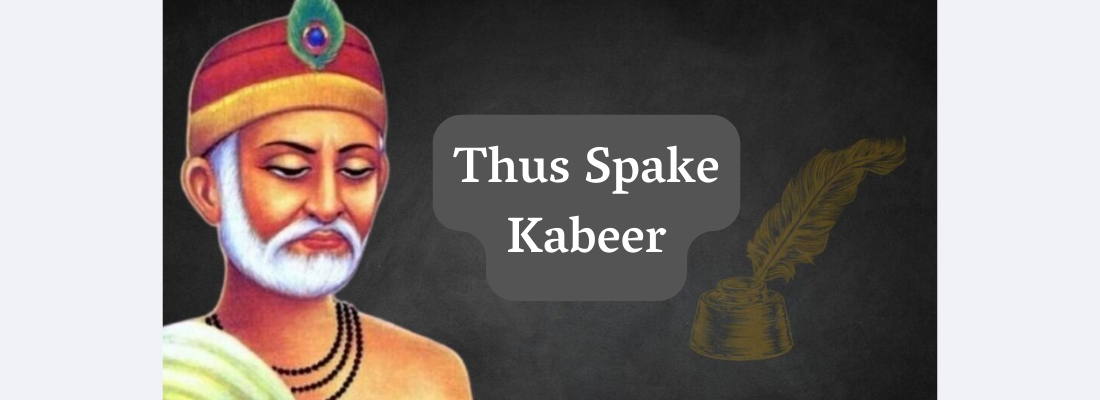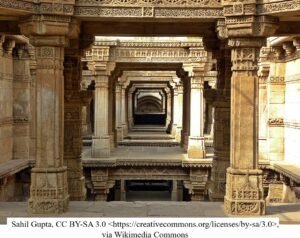Kabeerdaas ji is categorized as a saint but his thoughts and compositions are not confined to religion, spirituality, meditation and bhajans alone. He also deals with worldly life – the character and behaviour of individuals; practices (and malpractices) rampant in society; evils of caste system which divides people into ‘high’ and ‘low’ classes, etc. He also goes in depth in denouncing superstitions and hypocrisy prevalent in practice of religions and sects in general. He considers them as obstructions in the way of health, peace and happiness of society. We should take all these things into account if we want to understand and interpret Kabeer’s poetry correctly.
— Kusum Banthia
कस्तूरी कुंडल बसै, मृग ढूँढ़े बन माहि ।
ऐसे घट – घट राम है, दुनिया देखै नाहि ।।
Kastoori kundal basai, mrug dhoondhe ban maahi
aise ghat – ghat raam hai, duniyaa dekhai naahi
Before understanding the meaning of this couplet, it is important for us to understand what Kabeerdaas ji means by ‘Raama’. Kabeerdaas ji’s Raama is not Raama, the son of Dasharatha, who was born as a human as an incarnation of Vishnu and freed the earth from the tyranny of demons. Kabeerdaas ji’s Raama is formless (who has no shape or form) and Nirguna (who is pure consciousness without worldly characteristics). He is the Supreme God who is dwelling in every particle of all creation. After death, our souls merge with them. In this couplet, Kabeerdaas ji says, “An invaluable substance like musk lives in the navel of a deer (musk deer) but (due to his ignorance) he does not know it and is attracted by its fragrance and he wanders around looking for it in the surrounding forests. Similarly, God is – in the difference between – human beings in every particle of this world, but due to his ignorance, we do not understand this thing and wander in search of Him in the outside world. We are looking for him in various religious sects, places of worship, rituals, chanting, etc. The meaning is that God cannot be attained by the means, actions, etc. of the external world. Since he resides in our inner self, we will be able to realize it only through constant remembrance and spiritual practice by focusing the attention towards our difference. If we do not understand this truth, our movement will become like that of a musk deer who wanders outside in search of something inside him and despite being near him, he cannot find that thing.

सोना, सज्जन, साधुजन, टूट जुड़ै सौ बार ।
दुर्जन कुम्भ कुम्हार के, ऐकै धका दरार ।।
Sonaa, Sajjan, saadhujan, toot judai sau baar
Durjan, kumbh kumhaar ke, aikai dhakaa daraar
In many of his couplets, Kabeerdas ji has highlighted the characteristics of the character of sadhus or gentlemen. He uses the word ‘sadhu’ or ‘saint’ not only for the worldly ascetics, but for every person whose character is pure and whose feeling of public welfare is paramount in his heart. In this couplet, Kabeerdaas ji shows the characteristics of gentlemen, mentioning one of the main differences between the nature of gentlemen and wicked people. Gold is not only valuable but also strong. Even if the gold object breaks down for some reason, it can be melted and brought back to its original form. Such are gentlemen or saints. If there is a flaw in their character or behavior, then it is possible to improve it by effort. By correcting that flaw, their character and behavior become as pure as before. On the contrary, the nature of bad people or wicked people is similar to that of an earthen pot made by a potter. Such a pitcher breaks down with a slight push and then cannot get the same form as before. Similarly, evils easily enter the nature of wicked people and remain forever. They don’t go back on the right track.

-
Thus Spake Kabeer 01
Kabeerdaas ji is categorized as a saint but his thoughts and compositions are not confined to religion, spirituality, meditation and bhajans alone. He also deals with worldly life – the character and behaviour of individuals; practices (and malpractices) rampant in society; evils of caste system which divides people into ‘high’ and ‘low’ classes, etc. He…
-
Thus Spake Kabeer 02
Kabeerdaas ji is categorized as a saint but his thoughts and compositions are not confined to religion, spirituality, meditation and bhajans alone. He also deals with worldly life – the character and behaviour of individuals; practices (and malpractices) rampant in society; evils of caste system which divides people into ‘high’ and ‘low’ classes, etc. He…
-
Thus Spake Kabeer 03
Kabeerdaas ji is categorized as a saint but his thoughts and compositions are not confined to religion, spirituality, meditation and bhajans alone. He also deals with worldly life – the character and behaviour of individuals; practices (and malpractices) rampant in society; evils of caste system which divides people into ‘high’ and ‘low’ classes, etc. He…


